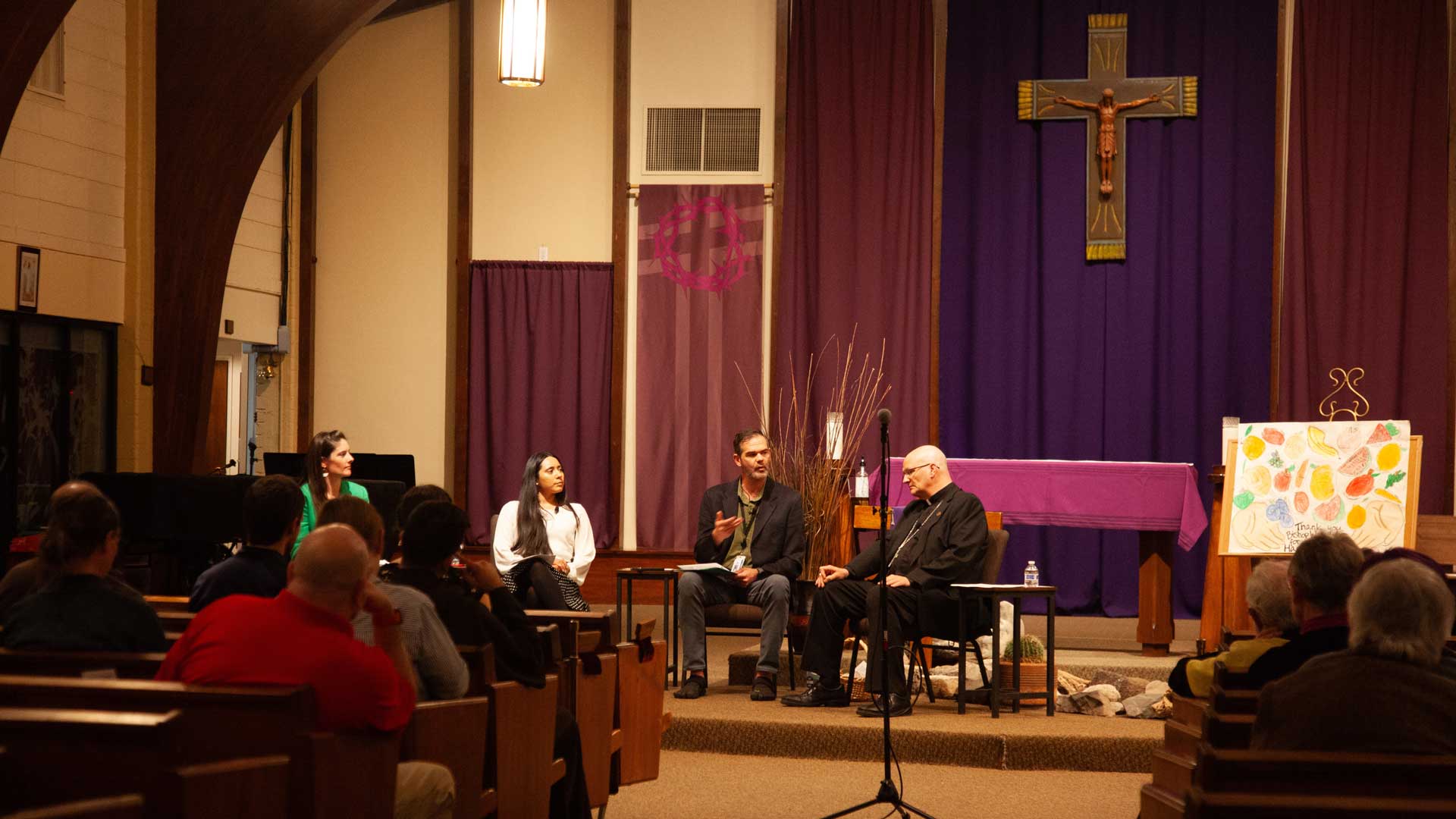 Gabrielle Cardenas, Brian Eller, and Bishop Edward Weisenburger sit on a panel discussion moderated by Ellen Fisher, on Monday, March 18, at the St. Thomas More Newman Center in Tucson, Ariz. Fisher (left) is the assistant director of the Catholic University of America in Tucson.
Gabrielle Cardenas, Brian Eller, and Bishop Edward Weisenburger sit on a panel discussion moderated by Ellen Fisher, on Monday, March 18, at the St. Thomas More Newman Center in Tucson, Ariz. Fisher (left) is the assistant director of the Catholic University of America in Tucson.
Bishop Edward Weisenburger of the Diocese of Tucson participated in a panel discussion this week at the St. Thomas More Catholic Newman Center on the University on Arizona campus, highlighting the role of the Catholic community in addressing climate change.
In November, Bishop Weisenburger alongside several other clergy members, visited the White House following the release of Pope Francis’ sixth apostolic exhortation, the “Laudate Deum,” which calls for government action on climate change.
Weisenburger said that the pastoral message conveyed the integrated ecological relationship between Catholicism and climate.
“You can’t isolate ecological issues and just talk about water pollution or soil degradation or decrease in the number of types of plans or the horrible air pollution or the rising sea levels,” Weisenburger said. “Without also seeing the impact they’re having on people.”
Pope Francis’ 2015 encyclical letter the “Laudato Si,” addressed climate change as a moral issue.
“It’s about creation and the call to stop the damage that we’re doing to God’s creation, [which] was renewed,” Weisenburger said.
During their visit to the White House, Weisenburger along with Archbishop John Wester from the Archdiocese of Santa Fe, New Mexico, Bishop Joseph Tyson from the Diocese of Yakima, Washington and St. Joseph Sr. Carol Zinn, executive director of the Leadership Conference, engaged with White House leaders John Podesta, senior advisor to the president for clean energy innovation and implementation, John McCarthy, senior advisor for political engagement and Ali Zaidi, national climate advisor on pending pollution regulations.
“The four issues we were most concerned about,” Weisenburger said, “which I think we share with the current administration was carbon pollution from power plants, methane levels, soot pollution and emissions standards for heavy duty vehicles.”
In December 2023, the Environmental Protection Agency (EPA) announced regulations to reduce methane and air pollutants from the oil and natural gas industry, followed by updated air quality standards for soot pollution regulation in February.
“We would like to think we had some influence,” Weisenburger added.
This week’s panel also featured Brian Eller with the Pima County Health Department who emphasized the need for clean air standards and the direct link between air quality and public health outcomes.
“For public health to do meaningful interventions, part of that is community building, education and just building awareness around what those issues actually look like,” Eller said.
Eller added that as a practicing Catholic who works in public health, he has found that Pope Francis’ teachings can be practically applied to help communities who are disproportionately affected by negative health outcomes in ways that are meaningful.
Gabrielle Cardenas, a young Catholic leader said that by being able to bridge the gap between the environment and faith, adds to her religious practice.
“It affects not just Catholics, it affects everybody in our whole world,” Cardenas said.

By submitting your comments, you hereby give AZPM the right to post your comments and potentially use them in any other form of media operated by this institution.